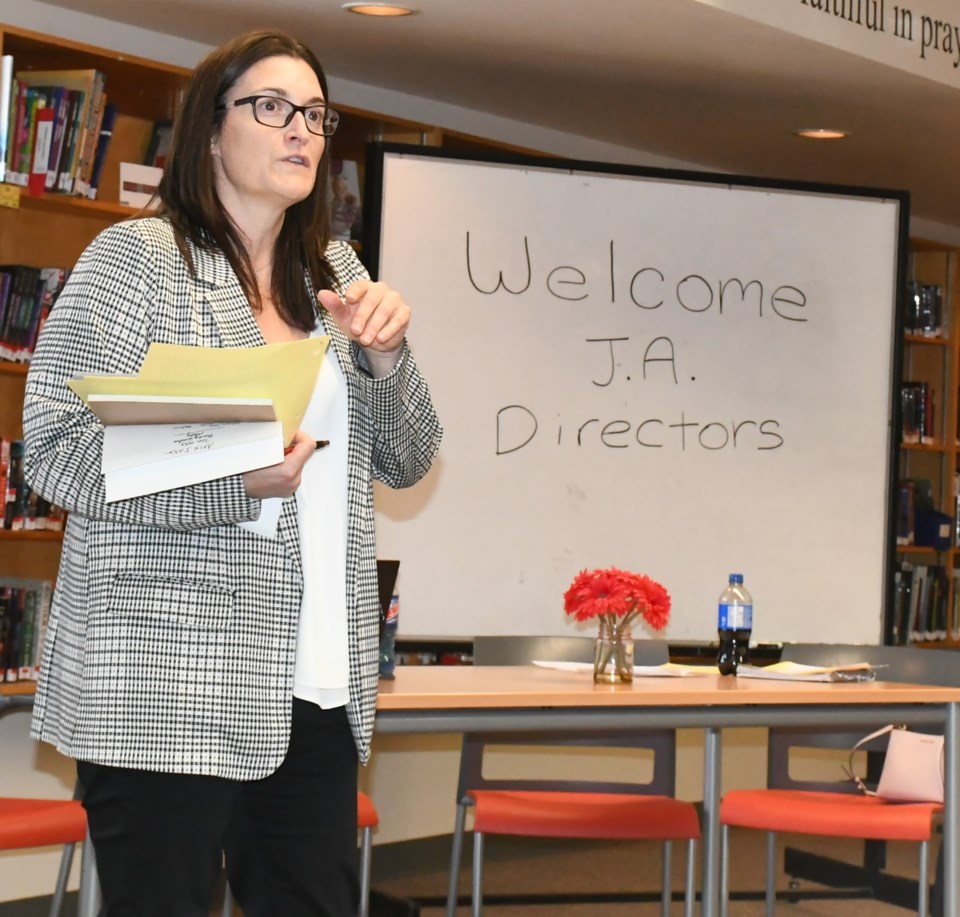Vanier Collegiate teacher Christa Lapointe says this year’s Junior Achievement projects in her Entrepreneurship 30 class were a great success and it was exciting to see the growth in her students.
This year there were two companies instead of the usual three, which meant both — one with nine students and another with 22 pupils — had to overcome certain challenges, Lapointe said on Jan. 19 after soup company Mix Inc. and clothing company Prairie Sky gave their wrap-up reports.
However, all students pulled together, addressed glaring issues, sold as best they could and worked to ensure their ventures succeeded.
“So at the end of the year, they’re always surprised when they actually see the (sales) numbers and see what they did and what they accomplished,” said Lapointe.
“And when they get to write the cheque and give the cheque to charity, that’s when (they realized), ‘Holy cow, that work was worth it and it meant something,’ and they can take a lot of pride in that. At the end of the semester, it’s always wonderful seeing them see the big picture and see where they started and where they ended.”
Junior Achievement (JA) is the world’s largest organization dedicated to educating students about entrepreneurship, work readiness and financial literacy through hands-on programs.
The youths in each company can submit their work to JA’s head office in Toronto for possible awards.
Mix Inc. had nine members, which allowed them to adapt more quickly to situations and streamline their processes, said Lapointe. Even though Prairie Sky had 22 members, they still completed their work, helped each other and showed initiative.
“Regardless of the group and size, they both succeeded and they both really learned a lot this semester,” she stated.
The Entrepreneurship 30 class is different than other courses because there are no exams, she continued. While there is plenty of curriculum-related education at the beginning of the semester, students are fully involved in their businesses at the halfway point.
While Lapointe could make suggestions, bring in mentors and speakers and provide support, the students had to make their own decisions, run their governance plans and operate their business models. She offered the students some advice and oversight but mostly left them alone.
“… other than that, they were very keen on open communications. They realized that they maybe needed more meetings to be on the same page, so there was a lot of maturity and awareness in all of them,” she said.
This year’s class received national attention, with JA’s head office informing the Saskatchewan rep about the Vanier projects and a former school graduate who runs an energy business in Alberta wanting to speak to the youths.
Lapointe thought it was neat for her class to receive that kind of attention, noting that community media is usually faithful in reporting on her class. Therefore, they’re sometimes surprised when they receive wider exposure.
“So it’s nice that our business education program at Vanier is healthy and strong. And it’s due to the interests and desires of the students,” she said.
Another highlight for the students was displaying their companies during a JA event at the Cornwall Centre in Regina in December, she continued. This allowed them to network with other student-run businesses, politicians, dignitaries and CEOs.
Some students have caught the entrepreneurial bug and want to continue in business, while others don’t but have a good appreciation of what business owners and managers do, Lapointe added. All these students now have a greater understanding of business than other youths or young adults.




